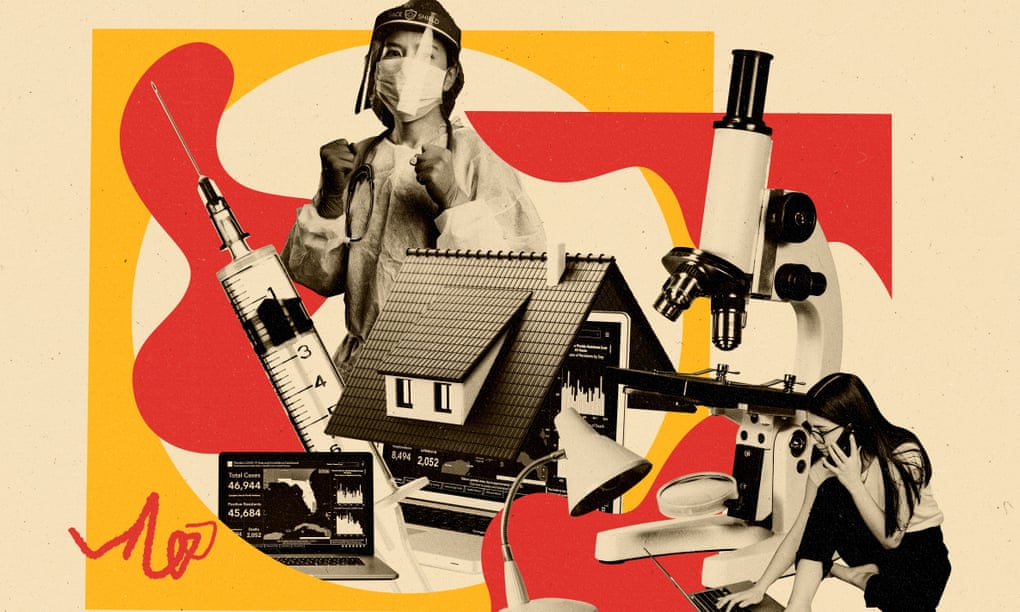COVID-19 caseloads are climbing again, and the Right continues to spread virus misinformation as the government struggles with its response. The Centers for Disease Control and Prevention has given contradictory advice over the past months concerning mask wearing—its May 13 mask recommendation lift for the vaccinated prompted celebration, but proved premature.
“Drowned out in the applause were expert warnings that there was no way to tell who was and who wasn’t vaccinated,” The Associated Press writes, “and a country restless for an end to the pandemic was essentially being placed on the honor system.” This in part allowed unvaccinated Americans to transmit the virus, thereby mutating the Delta strain.
News media now has an especially important role to counteract confusing government messaging and targeted disinformation. One way to achieve this is to promote a better understanding of science while identifying and disproving false claims. Unfortunately, not all media has helped to clarify the best available information; sensationalism and ever-present disinformation has muddied recent mainstream reporting.
On July 29, a story from the Washington Post exaggerated a federal directive on testing, masks, and vaccination, incorrectly describing a vaccine “mandate.” While the directive clearly aims to promote vaccinations, it requires federal workers and contractors to wear masks and receive tests, exempting vaccinated people—it doesn’t require anyone to get vaccinated. Still, the story includes several quotes from federal employees pushing back against the invented requirement.
Mandated vaccinations would accelerate the U.S.’s control of the pandemic, but face great resistance from those opposed to vaccines. FAIR’s Julie Hollar notes, “When journalists gin up controversy over lesser measures, they contribute to public misunderstandings of truth and reality, and make progress in the fight against COVID that much harder.”
Many companies are mandating vaccines before workers return to offices, including the Washington Post, CNN, Facebook, and Google. Fox News uses a voluntary reporting system that allows vaccinated employees to skip medical screenings—a similar policy to that of the White House, which the network’s top personalities have been decrying as part of its culture war and campaign to undermine public health. While Fox has faced the most criticism, polls suggest viewers of Newsmax and One America News are even more likely to be vaccine hesitant.
Many outlets have correctly explained how a large unvaccinated proportion of Americans threatens the entire world—thus, getting vaccinated isn’t a personal choice, as right-wing media claims. A narrative has emerged alongside this notion that America’s patience with unvaccinated people has snapped.
And though a stark partisan divide exists in vaccination rates, other fault lines are created by barriers to getting shots: white people have a 15% higher vaccination rate than Black people, and lower-income brackets appear to have a higher share of unvaccinated people than higher-income brackets.
Alongside statistics and sentiments, news outlets must provide nuance. Columbia Journalism Review’s Jon Allsop elaborates, “The most successful coverage seeks not to admonish, but to explain, teasing out the differences among types of vaccine rules, and considering their equity implications.”
A host of media outlets also botched a story about the Delta variant’s ability to spread among vaccinated people, based on an unpublished CDC slide presentation obtained by The Washington Post. In reality, these “breakthrough” infections are rare, and it’s rarer still that they cause hospitalization or death. In their rush to share the scoop, outlets including The New York Times, CNN, and NBC left out these details in headlines, failing to note that the CDC materials came with “several major caveats” and that they included promising facts about the Delta surge.
As the U.S. builds toward a continued vaccine rollout, mask mandates may be needed to curb the spread of the Delta variant. Media has a troubled record of covering state governors’ decisions on this matter—such as with Florida Governor Ron DeSantis, who was admired across media for his reckless disregard of public health for months before the state’s current COVID outbreak.
Inconsistent government guidelines and targeted lies have created a media environment where news consumers can’t trust what they read. The politicized imperative to “believe in science” is inadvisable without stressing the necessity of critical thinking; new research finds that people who “trust” science are more likely to believe and disseminate pseudoscience than people who demonstrate a stronger understanding of scientific methods.
Complex public health subjects such as the origins of a virus can be tough for laypeople to fully understand. A more sustainable solution for curbing misinformation than explaining specialized topics is helping the public develop a type of scientific literacy known as methodological literacy, according to the paper’s authors. “People who understand scientific methods and research designs can better evaluate claims about science and research.”
To this end, newsrooms should aim to shift their own and their consumers’ relationship with science to assess research and evaluate scientific claims. Reporting on doubts and uncertainty and a scientific method’s strengths and weaknesses could model this practice for readers. Journalists have a heightened responsibility to promote nuance and critical thinking in this manner as lives continue to depend on adhering to the best available information in spite of cascading falsehoods.
Illustration by Klawe Rzeczy/The Guardian

